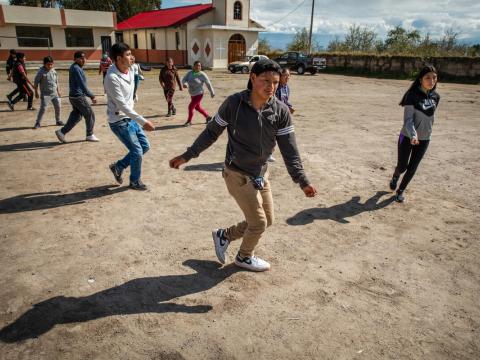Educating with tenderness for peaceful coexistence in schools in Latin America and the Caribbean

By Daniel Yépez, National Education Coordinator for World Vision Peru and Education Leader for World Vision Latin America and the Caribbean
Violence in schools suffered by children and adolescents in Latin America is very high: 4 out of 10 experience bullying in the region[1], being indigenous, migrant, and refugee children the most vulnerable. Regarding the latter population, more than 50% of children and adolescents remain outside the educational systems of the region due to poverty, discrimination, and xenophobia (Regional Inter-Agency Coordination Platform for Refugees and Migrants from Venezuela, 2020). Evidence also indicates that violence is replicated in homes and other community spaces.
According to the regional survey "Encounter with the Heart" of 2023 - conducted with children aged 10 to 17, from 13 countries in Latin America[2]- 8 out of 10 kids consider their schools unsafe; 4 out of 10 assume that their teachers do not talk to them to understand what is happening to them; 8 consider that forgiveness, repair, and reconciliation practices do not take place in their schools, and 9 out of 10 do not share their sorrows and sadness with their teachers.
It is not enough to simply say ‘no to violence in all its forms’ that may occur in schools; there is also an urgent need for tenderness. The main resource for education is affection and for a dignified childhood. Educating with tenderness involves placing the student at the centre of pedagogical actions, not as an object that learns, but as a human being with specific cognitive, emotional, and social conditions that need to be cared. Educating with recognition of rights, capacities, and responsibility of childhood for the care of their peers, allows kids to be the protagonist of educational meanings and actions. This sense of education should be orientated essentially towards inclusive, peaceful, democratic, and intercultural co-existence, with socio-emotional well-being as the basis for all learning for life.
Tenderness in schools is possible. In the "+DIVERSIDAD" (+DIVERSITY) programme implemented in Peru by a group of organisations[3] –where World Vision was part- and funded by Education Cannot Wait, the socio-emotional well-being strategy was implemented to promote intercultural, democratic, and inclusive coexistence in schools. This was led by World Vision Peru and Save The Children to assist the most vulnerable students, especially migrants and refugees. The work was carried out through two lines of action.
First, in the development of socio-emotional skills for students, considering their protagonism in pedagogical sessions at school and at home, with the participation of teachers and their families taking the perspective of tenderness for the development of these strategies and tools. Second, addressed the socio-emotional needs of students promptly to identify, support, and provide restorative practices from the school. Because of this, there is a perception in 51% of students of better coexistence in schools, overcoming xenophobia and violence in all its forms. In addition, 184 schools in two regions of Peru have implemented the strategy; 3,235 teachers and school leaders have been trained to implement this strategy; 770 teachers received emotional support in managing exhaustion and work-related stress, and 7,943 students have been accompanied in their socio-emotional needs.
Learning harmony coexistence in schools will influence that desired society where different people can dialogue and respect each other, and in that diversity build countries of well-being and justice. Learn more by watching the video below:
[1] UNICEF, 2021. Violence against children and adolescents in Latin America and the Caribbean 2015-2021 A systematic review.
[2] Survey conducted with 4,201 children and adolescents, driven by World Vision Latin America and the Caribbean, to listen to the voices of children with the purpose of taking actions based on and with those voices.
[3] This project lasted from 2021 to 2023 in its first phase, and in the consortium led by UNICEF, with participation of World Vision Peru, UNESCO, RET, Save The Children, HIAS, and Alternativa.